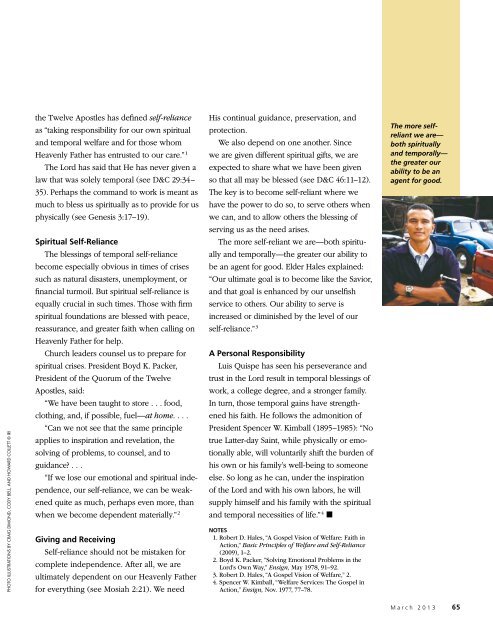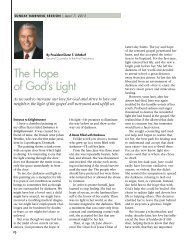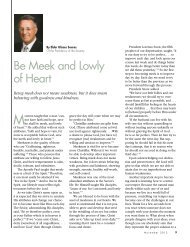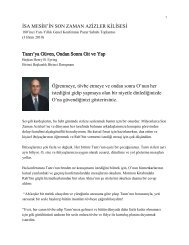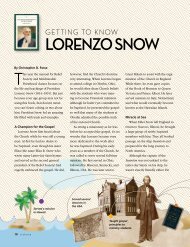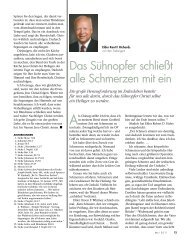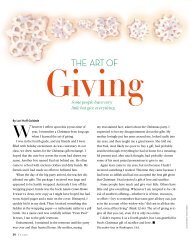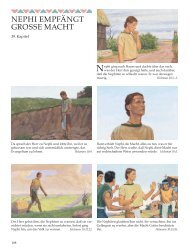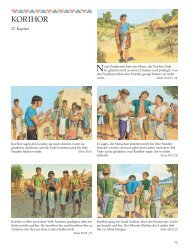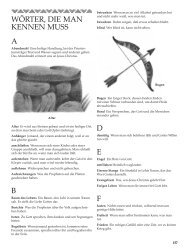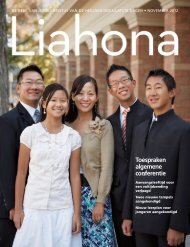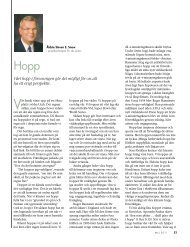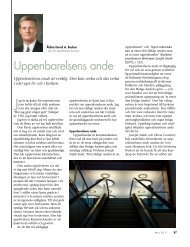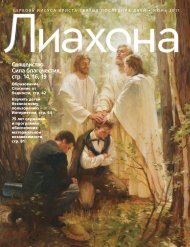March 2013 Ensign - The Church of Jesus Christ of Latter-day Saints
March 2013 Ensign - The Church of Jesus Christ of Latter-day Saints
March 2013 Ensign - The Church of Jesus Christ of Latter-day Saints
Create successful ePaper yourself
Turn your PDF publications into a flip-book with our unique Google optimized e-Paper software.
PHOTO ILLUSTRATIONS BY CRAIG DIMOND, CODY BELL, AND HOWARD COLLETT © IRI<br />
the Twelve Apostles has defined self-reliance<br />
as “taking responsibility for our own spiritual<br />
and temporal welfare and for those whom<br />
Heavenly Father has entrusted to our care.” 1<br />
<strong>The</strong> Lord has said that He has never given a<br />
law that was solely temporal (see D&C 29:34–<br />
35). Perhaps the command to work is meant as<br />
much to bless us spiritually as to provide for us<br />
physically (see Genesis 3:17–19).<br />
Spiritual Self-Reliance<br />
<strong>The</strong> blessings <strong>of</strong> temporal self-reliance<br />
become especially obvious in times <strong>of</strong> crises<br />
such as natural disasters, unemployment, or<br />
financial turmoil. But spiritual self-reliance is<br />
equally crucial in such times. Those with firm<br />
spiritual foundations are blessed with peace,<br />
reassurance, and greater faith when calling on<br />
Heavenly Father for help.<br />
<strong>Church</strong> leaders counsel us to prepare for<br />
spiritual crises. President Boyd K. Packer,<br />
President <strong>of</strong> the Quorum <strong>of</strong> the Twelve<br />
Apostles, said:<br />
“We have been taught to store . . . food,<br />
clothing, and, if possible, fuel—at home. . . .<br />
“Can we not see that the same principle<br />
applies to inspiration and revelation, the<br />
solving <strong>of</strong> problems, to counsel, and to<br />
guidance? . . .<br />
“If we lose our emotional and spiritual independence,<br />
our self-reliance, we can be weakened<br />
quite as much, perhaps even more, than<br />
when we become dependent materially.” 2<br />
Giving and Receiving<br />
Self-reliance should not be mistaken for<br />
complete independence. After all, we are<br />
ultimately dependent on our Heavenly Father<br />
for everything (see Mosiah 2:21). We need<br />
His continual guidance, preservation, and<br />
protection.<br />
We also depend on one another. Since<br />
we are given different spiritual gifts, we are<br />
expected to share what we have been given<br />
so that all may be blessed (see D&C 46:11–12).<br />
<strong>The</strong> key is to become self-reliant where we<br />
have the power to do so, to serve others when<br />
we can, and to allow others the blessing <strong>of</strong><br />
serving us as the need arises.<br />
<strong>The</strong> more self-reliant we are—both spiritually<br />
and temporally—the greater our ability to<br />
be an agent for good. Elder Hales explained:<br />
“Our ultimate goal is to become like the Savior,<br />
and that goal is enhanced by our unselfish<br />
service to others. Our ability to serve is<br />
increased or diminished by the level <strong>of</strong> our<br />
self-reliance.” 3<br />
A Personal Responsibility<br />
Luis Quispe has seen his perseverance and<br />
trust in the Lord result in temporal blessings <strong>of</strong><br />
work, a college degree, and a stronger family.<br />
In turn, those temporal gains have strengthened<br />
his faith. He follows the admonition <strong>of</strong><br />
President Spencer W. Kimball (1895–1985): “No<br />
true <strong>Latter</strong>-<strong>day</strong> Saint, while physically or emotionally<br />
able, will voluntarily shift the burden <strong>of</strong><br />
his own or his family’s well-being to someone<br />
else. So long as he can, under the inspiration<br />
<strong>of</strong> the Lord and with his own labors, he will<br />
supply himself and his family with the spiritual<br />
and temporal necessities <strong>of</strong> life.” 4 ◼<br />
NOTES<br />
1. Robert D. Hales, “A Gospel Vision <strong>of</strong> Welfare: Faith in<br />
Action,” Basic Principles <strong>of</strong> Welfare and Self-Reliance<br />
(2009), 1–2.<br />
2. Boyd K. Packer, “Solving Emotional Problems in the<br />
Lord’s Own Way,” <strong>Ensign</strong>, May 1978, 91–92.<br />
3. Robert D. Hales, “A Gospel Vision <strong>of</strong> Welfare,” 2.<br />
4. Spencer W. Kimball, “Welfare Services: <strong>The</strong> Gospel in<br />
Action,” <strong>Ensign</strong>, Nov. 1977, 77–78.<br />
<strong>The</strong> more self-<br />
reliant we are—<br />
both spiritually<br />
and temporally—<br />
the greater our<br />
ability to be an<br />
agent for good.<br />
<strong>March</strong> <strong>2013</strong> 65


